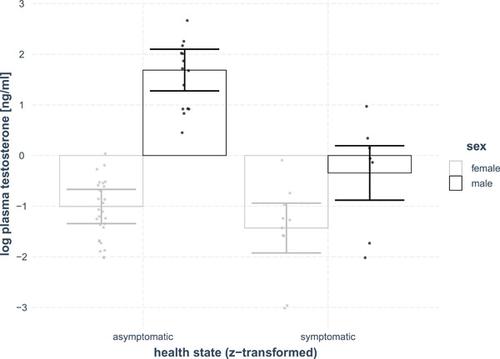当前位置:
X-MOL 学术
›
Am. J. Primatol.
›
论文详情
Our official English website, www.x-mol.net, welcomes your feedback! (Note: you will need to create a separate account there.)
Blood testosterone levels in sickness and in health: Male chimpanzee testosterone levels decrease in face of an immune challenge
American Journal of Primatology ( IF 2.4 ) Pub Date : 2021-10-18 , DOI: 10.1002/ajp.23334 Ruth Sonnweber 1 , Jeroen M G Stevens 2, 3 , Gottfried Hohmann 4 , Tobias Deschner 5 , Verena Behringer 5, 6
American Journal of Primatology ( IF 2.4 ) Pub Date : 2021-10-18 , DOI: 10.1002/ajp.23334 Ruth Sonnweber 1 , Jeroen M G Stevens 2, 3 , Gottfried Hohmann 4 , Tobias Deschner 5 , Verena Behringer 5, 6
Affiliation

|
As an integral part of the immune response, testosterone secretion is inhibited when an individual is confronted with an immune challenge. Testosterone-mediated physiological, morphological, and behavioral traits are compromised at times of impaired health. Nevertheless, males of some species seem to maintain high levels of testosterone when confronted with an immune challenge, upholding competitive strength but compromising their immune response. It has been argued that this phenomenon will occur only in species living in social systems with high degrees of male-male competition over mating opportunities. Male chimpanzees contest over access to fertile females and dominants sire the majority of offspring. This male mating pattern makes chimpanzees a candidate species where we could expect males to maintain high testosterone levels, compromising their immune response, to ensure immediate reproductive success. We measured blood testosterone levels in male and female chimpanzees, who expressed clinical symptoms (symptomatic) or showed no evidence of clinical disease on assessment (asymptomatic). For females, we expected to find lower testosterone levels in symptomatic individuals than in asymptomatic subjects. In males, we would predict lower testosterone levels in symptomatic individuals than in asymptomatic males, if the immune response leads to a decrease in testosterone secretion. Alternatively, males could have equal levels of testosterone when symptomatic and asymptomatic, upholding competitive strength. Our results show that male chimpanzees exhibit lower levels of testosterone when confronted with an immune challenge than when being asymptomatic. This suggests that male testosterone secretion is suppressed as part of the immune response, which potentially increases survival and lifetime reproductive success. It will, however, negatively impact momentary competitive ability. Also, males may employ different mating strategies, some of which are less testosterone-driven (e.g., affiliative strategies). Consequently, in some individuals, the costs of maintaining high testosterone levels may not outweigh the potential gain in reproductive success.
中文翻译:

疾病和健康中的血液睾酮水平:面对免疫挑战,雄性黑猩猩的睾酮水平会下降
作为免疫反应的一个组成部分,当个体面临免疫挑战时,睾酮分泌会受到抑制。睾酮介导的生理、形态和行为特征在健康受损时会受到影响。然而,一些物种的雄性在面临免疫挑战时似乎保持高水平的睾酮,维持了竞争力,但损害了它们的免疫反应。有人认为,这种现象只会发生在生活在雄性与雄性之间高度竞争交配机会的社会系统中的物种中。雄性黑猩猩争夺生育能力的雌性,而优势雄性黑猩猩则产生了大多数后代。这种雄性交配模式使黑猩猩成为候选物种,我们可以期望雄性保持高睾酮水平,损害它们的免疫反应,以确保立即繁殖成功。我们测量了雄性和雌性黑猩猩的血液睾酮水平,它们表现出临床症状(有症状)或在评估时没有显示出临床疾病的证据(无症状)。对于女性,我们预计有症状个体的睾酮水平低于无症状个体。在男性中,如果免疫反应导致睾酮分泌减少,我们将预测有症状个体的睾酮水平低于无症状男性。或者,男性在有症状和无症状时的睾酮水平可能相同,从而保持竞争力。我们的研究结果表明,雄性黑猩猩在面临免疫挑战时的睾酮水平低于无症状时。这表明男性睾酮分泌作为免疫反应的一部分受到抑制,这可能会增加存活率和终生繁殖成功率。然而,它会对暂时的竞争能力产生负面影响。此外,雄性可能采用不同的交配策略,其中一些受睾酮驱动较少(例如,亲和策略)。因此,在某些人中,维持高睾酮水平的成本可能不会超过生殖成功的潜在收益。
更新日期:2021-10-18
中文翻译:

疾病和健康中的血液睾酮水平:面对免疫挑战,雄性黑猩猩的睾酮水平会下降
作为免疫反应的一个组成部分,当个体面临免疫挑战时,睾酮分泌会受到抑制。睾酮介导的生理、形态和行为特征在健康受损时会受到影响。然而,一些物种的雄性在面临免疫挑战时似乎保持高水平的睾酮,维持了竞争力,但损害了它们的免疫反应。有人认为,这种现象只会发生在生活在雄性与雄性之间高度竞争交配机会的社会系统中的物种中。雄性黑猩猩争夺生育能力的雌性,而优势雄性黑猩猩则产生了大多数后代。这种雄性交配模式使黑猩猩成为候选物种,我们可以期望雄性保持高睾酮水平,损害它们的免疫反应,以确保立即繁殖成功。我们测量了雄性和雌性黑猩猩的血液睾酮水平,它们表现出临床症状(有症状)或在评估时没有显示出临床疾病的证据(无症状)。对于女性,我们预计有症状个体的睾酮水平低于无症状个体。在男性中,如果免疫反应导致睾酮分泌减少,我们将预测有症状个体的睾酮水平低于无症状男性。或者,男性在有症状和无症状时的睾酮水平可能相同,从而保持竞争力。我们的研究结果表明,雄性黑猩猩在面临免疫挑战时的睾酮水平低于无症状时。这表明男性睾酮分泌作为免疫反应的一部分受到抑制,这可能会增加存活率和终生繁殖成功率。然而,它会对暂时的竞争能力产生负面影响。此外,雄性可能采用不同的交配策略,其中一些受睾酮驱动较少(例如,亲和策略)。因此,在某些人中,维持高睾酮水平的成本可能不会超过生殖成功的潜在收益。


























 京公网安备 11010802027423号
京公网安备 11010802027423号